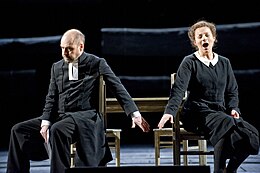Stiffelio
| Stiffelio | |
|---|---|
| Opera by Giuseppe Verdi | |

Lars Cleveman as Stiffelio
and Lena Nordin as Lina, Königliche Oper, Stockholm 2011 |
|
| Librettist | Francesco Maria Piave |
| Language | Italian |
| Based on | Le pasteur, ou L'évangile et le foyer by Émile Souvestre and Eugène Bourgeois |
| Premiere | 16 November 1850 Teatro Grande, Trieste |
Stiffelio is an opera in three acts by Giuseppe Verdi, from an Italian libretto by Francesco Maria Piave. The origin of this was the novel “Le pasteur d’hommes”, by Émile Souvestre, which was published in 1838. This was adapted into the French play Le pasteur, ou L'évangile et le foyer by Émile Souvestre and Eugène Bourgeois. That was in turn translated into Italian by Gaetano Vestri as Stifellius; this formed the basis of Piave's libretto.
Verdi's experience in Naples for Luisa Miller had not been a good one and he returned home to Busseto to consider the subject for his next opera. The idea for Stiffelio came from his librettist and, entering into a contract with his publisher, Ricordi, he agreed to proceed, leaving the decision as to the location of the premiere to Ricordi. This became the Teatro Grande (now the Teatro Comunale Giuseppe Verdi) in Trieste and, in spite of difficulties with the censors which resulted in cuts and changes, the opera - Verdi's 16th - was first performed on 16 November 1850.
Before Luisa Miller was staged in Naples, Verdi had offered the San Carlo company another work for 1850, with the new opera to be based on Victor Hugo's Le roi s'amuse from a libretto to be written by Salvadore Cammarano. But his experience with Luisa was such that he decided not to pursue this, and approached his publisher, Giulio Ricordi, with the proposal that he should work with the librettist on the possibility of an opera, Re Lear, which would be based on Shakespeare's King Lear and which had long been on Verdi's mind. However, by June 1850 it became clear that the subject was beyond Cammarano's ability to fashion into a libretto, and so it was abandoned. However, the commitment to Ricordi remained.
...
Wikipedia
